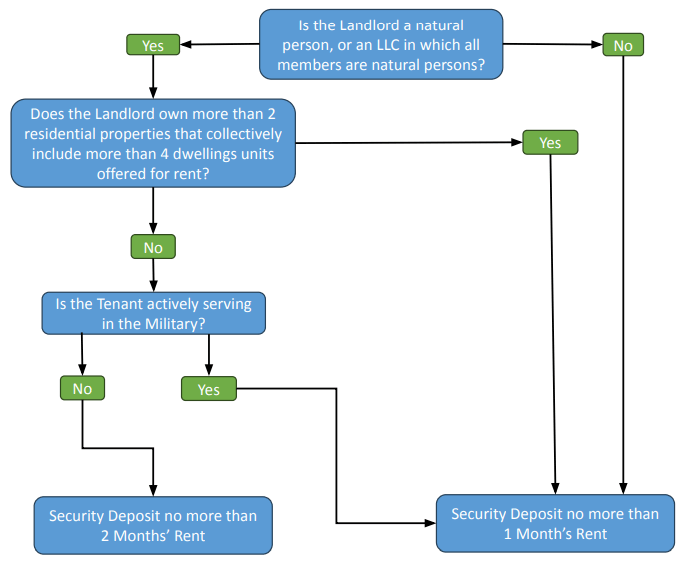Leases are living, breathing creatures. Does your San Francisco lease agreement reflect changes in the law?

One of our followers once quipped that when renting out a unit to a new tenant, he was going to put up a bookshelf on which to place the reams of disclosures for the incoming tenant to be compliant with the law. To which we recommend adding more space to the bookshelf for this year.
It’s been some time since San Francisco leases needed any substantial overhaul, but you can now crumple up the rental agreements you have been using in light of new legislation signed into law in 2023.
The first item that jumps off the page is changes that account for new security deposit laws that go into effect on July 1, 2024. While the law states that housing providers can only demand a security deposit up to the equivalent of one month’s rent, there are exemptions carved out.
We’ll need to ascertain the ownership structure of the building and the portfolio of the landlord. Owners who are “natural persons” and who own no more than two residential rental properties with a total of no more than four dwelling units can demand up to the equivalent of two months’ rent as a security deposit. We’ve put together a cheat sheet to understand which rules apply.

Let’s talk about utilities.
Utilities are another murky topic and one we must address at the inception of the tenancy, leaving no doubt as to who is responsible for paying what, and what billing system is used. Ideally, tenants should be charged for individual usage, but this is not a perfect world. Submeters are not feasible for many old buildings in San Francisco and retrofitting meters is a costly and complex undertaking.
In master-metered buildings, landlords have to rely on tenants to be conscientious about conserving energy, taking shorter showers, and turning off the lights when they are not home, but this frugal behavior is by no means guaranteed. Many housing providers, then, have turned to “RUBS,” an acronym for Ratio Utility Billing System. Under RUBS, the cost of electricity, water, sewage, gas, and trash collection are divvied up according to an estimate of how much of these services each unit consumes.
It makes sense that larger units with more bedrooms and household members with more devices would gobble up more electricity and heat, accumulate more garbage, and use more water, right? This seems like the most equitable way of sharing utilities; a 3-bedroom unit with several people living together will be a heavier consumer than, say, a bachelor living out of a studio apartment.
Yet Rent Boards have been distrustful of RUBS. Tenants with volatile utility bills are prone to complain to the Rent Board over proportional utility charges. At any rate, there are a myriad of rules relating to rent increases and pass-throughs best approached with Bornstein Law. As we draft your 2024 lease, we will be mindful of this critical aspect of utilities.

Be sure to address ‘Wheelmageddon’ in your lease.
E-bikes, e-scooters, and e-skateboards - known as “micromobility devices” - are buzzing around everywhere, but where should they be stored and charged? Effective January 1, 2024, California residents are allowed to store and charge one personal micromobility device per occupant within the rental unit, subject to certain limitations such as battery safety standards and proper insurance obtained by the tenant.
We are not fans of the new law - it is as if the manufacturers of these devices descended on Sacramento to write their own law - but we’ll have to deal with it. Enforcement may prove to be challenging; barring a hallway monitor, it will be difficult to identify the whereabouts of these devices, who owns them, and how they are being stored/charged.
Having said that, landlords and their agents need to be the eyes and ears of their properties. Through a bit of investigative efforts, stressing the importance of following the rules, and creating a culture of compliance, housing providers will have greater insulation from liability, and let’s not forget the purpose of the law: to reduce the risk of fire.
Bornstein Law has prepared the required verbiage to be included in a new lease or added to an existing lease through a proper change in the terms of tenancy.
As a sidebar, you can expect further amendments to San Francisco’s fire code to restrict how lithium-ion batteries can be charged and stored in the city. With these devices bursting into flames, Supervisors have signaled their intention to enact further safeguards. Of course, we will make our community aware if there are still more requirements to comply with.
Laundry wars
With the skyrocketing costs of utilities that laundry appliances use, many housing providers have increased prices for tenants. It turns out that renters do not like putting in those extra quarters into the machines and this can lead to friction in the rental relationship.
While the future of laundry has arrived by moving away from cash, not all tenants like smart card systems and phone apps to do their laundry.
In your 2024 lease, tenants should be alerted that the owner has the right to change rates and methods of payment at their discretion and that any changes do not constitute a rent increase or can be construed as a reduction in services promised at the inception of the tenancy.
Who is authorized to manage the property, receive rent payments, receive service of notices and other documents?
This must be clearly spelled out in the lease. The failure to list the management company or other agent/representative can tank an unlawful detainer (eviction) action.
Parting thoughts
A recurring theme in our practice is housing providers using stale leases that do not account for changes in the law. Even worse is using generic leases downloaded from the internet. Leases are living, breathing documents that must reflect changes in the law.
Countless landlords have used the same leases for years and have gotten a false sense of confidence because everything has been going fine with these bad and obsolete leases. Yet they can go from a hero to a zero once something goes wrong in the rental relationship. Keep in mind that there are brilliant tenants’ attorneys who can identify mistakes like a heat-seeking missile.
When in doubt, reach out to your advocates at Bornstein Law to review your rental agreements to see if they are fit for the modern era of your regulatory regime. Bornstein Law is always happy to assist.
